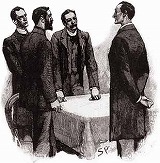“Having secured him, it is evident to me that a consultation of some sort was held. Probably it was something in the nature of a judicial proceeding. It must have lasted for some time, for it was then that these cigars were smoked. The older man sat in that wicker chair; it was he who used the cigar-holder. The younger man sat over yonder; he knocked his ash off against the chest of drawers. The third fellow paced up and down. Blessington, I think, sat upright in the bed, but of that I cannot be absolutely certain.

“Well, it ended by their taking Blessington and hanging him. The matter was so prearranged that it is my belief that they brought with them some sort of block or pulley which might serve as a gallows. That screw-driver and those screws were, as I conceive, for fixing it up. Seeing the hook, however, they naturally saved themselves the trouble. Having finished their work they made off, and the door was barred behind them by their confederate.”
We had all listened with the deepest interest to this sketch of the night’s doings, which Holmes had deduced from signs so subtle and minute that, even when he had pointed them out to us, we could scarcely follow him in his reasonings. The inspector hurried away on the instant to make inquiries about the page, while Holmes and I returned to Baker Street for breakfast.
“I’ll be back by three,” said he when we had finished our meal. “Both the inspector and the doctor will meet me here at that hour, and I hope by that time to have cleared up any little obscurity which the case may still present.”
Our visitors arrived at the appointed time, but it was a quarter to four before my friend put in an appearance. From his expression as he entered, however, I could see that all had gone well with him.
“Any news, Inspector?”
“We have got the boy, sir.”
“Excellent, and I have got the men.”

“You have got them!” we cried, all three.
“Well, at least I have got their identity. This so-called Blessington is, as I expected, well known at headquarters, and so are his assailants. Their names are Biddle, Hayward, and Moffat.”
“The Worthingdon bank gang,” cried the inspector.
“Precisely,” said Holmes.
“Then Blessington must have been Sutton.”
“Exactly,” said Holmes.
“Why, that makes it as clear as crystal,” said the inspector.
But Trevelyan and I looked at each other in bewilderment.
“You must surely remember the great Worthingdon bank business,” said Holmes. “Five men were in it - these four and a fifth called Cartwright. Tobin, the care-taker, was murdered, and the thieves got away with seven thousand pounds. This was in 1875. They were all five arrested, but the evidence against them was by no means conclusive. This Blessington or Sutton, who was the worst of the gang, turned informer. On his evidence Cartwright was hanged and the other three got fifteen years apiece. When they got out the other day, which was some years before their full term, they set themselves, as you perceive, to hunt down the traitor and to avenge the death of their comrade upon him. Twice they tried to get at him and failed; a third time, you see, it came off. Is there anything further which I can explain, Dr. Trevelyan?”
“I think you have made it all remarkably clear,” said the doctor. “No doubt the day on which he was so perturbed was the day when he had seen of their release in the newspapers.”
“Quite so. His talk about a burglary was the merest blind.”
“But why could he not tell you this?”